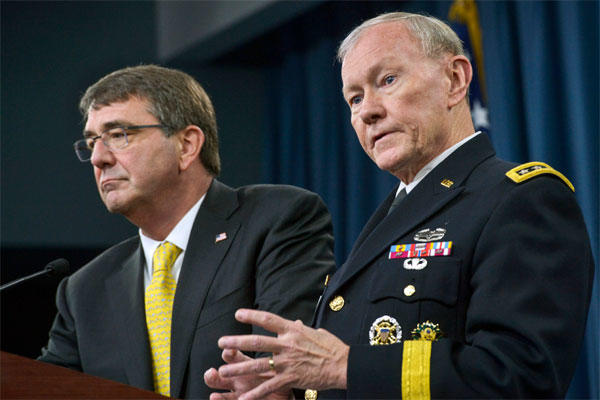The U.S. this week began training and equipping about 90 Syrian opposition fighters in the long-stalled effort to build a force of about 5,000 to combat ISIS, Defense Secretary Ashton Carter said Thursday.
Carter declined to say where the training was taking place but it was believed to be in Turkey.
"I'd rather not talk about location," Carter said, underlining the sensitivity of the program for U.S. allies in the region.
At a Pentagon briefing, Carter also was vague on whether the U.S. would back the force with airstrikes once it is deployed and whether the U.S. was prepared to supply the rebels with heavy weapons.
Carter said that "we would have some responsibility to protect the force. We haven't decided in detail how to exercise that responsibility." The Syrians in the training program were being paid – "they do receive compensation" – but Carter declined to say how much.
U.S. Central Command's Maj. Gen. Michael Nagata, who is in charge of the training and equipping program, was expected to begin training another group of about 90 rebels in the coming weeks, Carter said.
He said the process of vetting, training and equipping "moderate" Syrian fighters was complex and would evolve over time.
"It will need to prove itself," Carter said.
He also could not say how the U.S. would respond if the Syrian rebel force attacked the troops of Syrian President Bashar al-Assad, or if Assad's forces attacked them.
"They're being trained and equipped to fight ISIL," another acronym for the Islamic State of Iraq and Syria, Carter said.
"They're not being asked by us" to engage Assad's troops, Carter said. When asked if the U.S. would still support the rebels if they attacked Assad's troops, Carter said: "We would, but they're not being fielded for that purpose. We have not determined all of the rules of engagement" for the rebels, Carter said.
Joint Chiefs Chairman Gen. Martin Dempsey agreed that the Al Nusra front and other radical rebel groups in Syria had recently made gains against Assad's forces. Dempsey, who joined Carter at the Pentagon briefing, said the possible fall of Assad would not alter the main mission of the U.S. to combat ISIS but "it would make the situation in Syria more complicated."
On other issues, Carter declined to confirm that a U.S. drone strike in Yemen had killed a major figure of the Al Qaeda in the Arabian Peninsula terror group believed responsible for the attack on the offices of the satirical Charlie Hebdo magazine in Paris.
The outgoing Dempsey, who will be replaced as JCS Chairman in the coming months by Marine Commandant Gen. Joseph Dunford, said that ISIS had gained control of perimeter areas around the Baiji oil refinery in central Iraq, a critical facility for the Baghdad government that has been contested for months.
Since Tuesday, the U.S. has conducted 26 airstrikes around Baiji and made a successful airdrop resupply to Iraqi forces defending Baiji, with 18 out of 18 pallets landing inside the targeted drop zone, Dempsey said.
-- Richard Sisk can be reached at richard.sisk@military.com






























